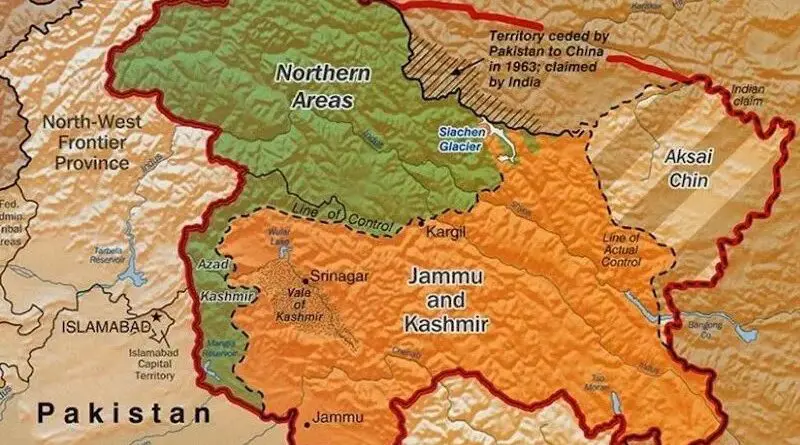Kashmir: A Long-Standing Conflict Requiring Global Attention – OpEd
Kashmir, a region of breathtaking natural beauty, has been a flashpoint for conflict for over seven decades. Nestled in the Himalayas, it has witnessed a tumultuous history of territorial disputes and political unrest. As the world grapples with numerous global crises, the need to focus on Kashmir becomes increasingly important. This article explores the intricate web of political, social, and human rights issues that demand the world’s attention.
Kashmir’s turbulent history can be traced back to the partition of British India in 1947. The region’s strategic location and its predominantly Muslim population made it a contentious issue for India and Pakistan. Since then, three wars and numerous conflicts have taken place, resulting in the Line of Control (LoC) effectively dividing Kashmir into two territories, each administered by India and Pakistan, while also giving rise to a third region under Chinese administration.
Kashmir is not just a territorial dispute; it’s also a humanitarian crisis. The region has witnessed a cycle of violence, curfews, and human rights abuses for decades. Reports of extrajudicial killings, torture, and enforced disappearances are common. Freedom of speech and expression has been curtailed, with the Indian government frequently imposing communication blackouts and internet restrictions. Kashmiri civilians, caught in the crossfire between militants and security forces, endure immense suffering. As international attention wavers, the plight of ordinary Kashmiris remains dire. There is a desperate need to address the humanitarian crisis that has persisted for too long.
The Role of Global Powers
The Kashmir conflict is not limited to the Indian subcontinent; it has far-reaching implications for regional and global stability. Both India and Pakistan possess nuclear weapons, making the conflict incredibly dangerous. As the world’s great powers grapple with their own challenges, they should not overlook the potential threat posed by this longstanding conflict.
The United Nations has consistently called for a peaceful resolution to the Kashmir conflict. The UN’s role is vital in this regard, as it is not merely a regional but a global issue. The international community should pressure both India and Pakistan to engage in constructive dialogue and adhere to the UN’s resolutions.
Diplomacy, not conflict, should be the avenue for addressing the Kashmir issue. Engaging in open and unbiased dialogue that considers the aspirations of the Kashmiri people is crucial. The world’s leaders, particularly those with influence in the region, need to promote peaceful negotiations.
Kashmir deserves a future free from violence and human rights abuses. As the world emphasizes the importance of human rights, it must be consistent in addressing the issue in all regions, including Kashmir. The global community should advocate for freedom of speech, the rule of law, and respect for human rights in the region.
The issue of Kashmir goes beyond the territorial ambitions of India and Pakistan. It is a matter of self-determination for the Kashmiri people. They deserve the opportunity to decide their future in a free and impartial plebiscite. The world should not ignore their legitimate aspirations.
Kashmir is a region blessed with vast natural resources, including fertile land and a thriving tourist industry. Peace and stability in the region could unlock its economic potential. Investment, infrastructure development, and employment opportunities are essential for the region’s progress.
Conclusion
Kashmir remains an unsolved puzzle, and the situation continues to deteriorate. The world should not lose sight of the Kashmir conflict amidst a plethora of global crises. Kashmir’s plight is a test of the international community’s commitment to peace, human rights, and self-determination. The region deserves attention, not only for its own sake but also for the sake of regional and global stability. It’s time for the world to focus on Kashmir and work towards a peaceful resolution.


Good luck getting any one to give a hoot about Kashmir now. There is no violence, no stone pelting and no funding from the bankrupt Pakistan. The people are begging for stability and seeking stable leadership that only India can offer. Plus with the Russia Ukraine war and now the Isreal Hamas war, no one cares about this issue.
Mr Imran should
focus on the dire situation in Pakistan as well as the severe oppression and killings of minorities, a blasphemy law that allows anyone to be killed, a military that steals all the money while starving its citizens, the destruction of balochistan and the handover of its lands to China . That will be so much better for this journalist s future .
Half baked article, with no real work of Journalism… Does the author know, it was Pakistan who first attacked an Independent state of Kashmir and it is Pakistan who need to vacate Pakistan first? Does Imran know what is UN resolution on this conflict it is.. the first requirement is for Pakistan and it’s military to vacate Pakistan Occupied Kashmir first and then followed by a plebiscite… how do you account for the change in Demographics for the last 75 years? Useless, baseless, lazy article with zero effort…
Wonder why Pakistan academics keep parroting Kashmir issue which in fact was never an issue. Kashmir was part of India-Bharat and shall remain so. Spend your energies in solving the problems Pakistan is engulfed in internal and external fronts. Pakistan was built through discriminatory hatred, radicalized population, that promoted ethnic cleansing, your madrasas teach jihad to produce terrorists, your schools teach history of hate as the country has no history as it born through hatred by dividing INDIA by the British in 1947. To exist and prosper peacefully need to return the illegally occupied J&K to India as per the wishes of the people of Gilgit and Baltistani citizens. Treat every Pakistani citizens equally be it Hindus, Ahamdias, Sikhs, Christians etc and empower the women. Remember your ancestors were Buddhists and Hindus, teach your citizens to be proud of that lineage and learn to live in peace.